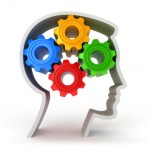Do You Mind?
 Ask yourself the tough questions: Do you mind your brain? Do you know your noggin’? Can you claim cerebral ownership or is your mental a rental?
Ask yourself the tough questions: Do you mind your brain? Do you know your noggin’? Can you claim cerebral ownership or is your mental a rental?
Although these questions are relevant at virtually all lifespan stages, firm answers can sometimes appear inconceivable. Unfortunately with advancing age, attention to mental performance is often either abandoned or framed in terms of perceived impairment and decline. Now, I have previously shared my message on minding the aging brain with SharpBrains readers. As a cognitive neuropsychiatrist primarily interested in later-life phenomena, I tend to stick to my area of expertise. Nevertheless, whether you are elder or not, I implore you to take these ideas to heart…do you mind?
Just as brain fitness is for all, aging is similarly universal. Every thoughtful individual recognizes the unavoidable answer to “are you aging?” However, the answer to “how are you aging?” is less obvious to most, and is even more obscure when considering lifespan cognitive trajectories. In fact, no consensus lexicon yet exists to describe the ways in which cognition can be modulated to achieve desired lifestyle or clinical goals.
In my latest publication on technology-enabled cognitive training for healthy elders, I outline a proposed lexicon for positive cognition interventions, as well as a framework for classifying putative benefits of cognitive training. Here, I will present these concepts without regard to age, as they apply equally well to all sapient sapiens:
? Cognitive stimulation refers to nontargeted engagement that generally enhances mental functioning. Examples might include educational endeavors or life review.
? Cognitive training refers to theory-driven intervention, supported by a conceptual framework and specified neurocognitve mechanisms. Examples might include mnemonic strategy adoption or software-based brain fitness programs.
? Cognitive rehabilitation strategies address impairments resulting from neuropsychiatric disorders. Examples might include post-stroke language therapy or targeted programs to remediate attention deficits or dyslexia.
? Cognitive enrichment further includes a range of lifestyle behaviors which can benefit cognitive performance, including multimodal brain fitness interventions involving physical, nutritional, and social activity.
Although there are similarities to these concepts, the distinctions are instructive and reflect a synthesis of perspectives. Positive cognition is intended to be a descriptive term which subsumes these as well as enhancement or cosmetic approaches, which may involve pharmaceutical or direct modulation of neural systems with magnetic, electrical, or optical energy. The essence of positive cognition is the intent to influence lifespan cognition toward the optimal, or even to extend the range of possibilities defined by biology.
Now, whatever your stage of life and whichever approach to positive cognition is most relevant to your goals, be sure to ask yourself some tough questions. If you come up with good answers, please don’t hesitate to leave your comments below. Of course, if you would like to share your critique of my ideas or of positive cognition with other SharpBrains readers, I certainly won’t mind.
 —- Educated and trained at Harvard, Yale, Columbia, and in the heart of Brooklyn, Dr. Steinerman’s ambition is to contribute to the prevention of Alzheimer’s disease, one of the great challenges of the 21st century. He is Assistant Professor of Neurology at the Albert Einstein College of Medicine and Montefiore Medical Center in New York City, where he founded the Center for Healthy Brain Aging. He is also the founding scientist of ProGevity Neuroscience.
—- Educated and trained at Harvard, Yale, Columbia, and in the heart of Brooklyn, Dr. Steinerman’s ambition is to contribute to the prevention of Alzheimer’s disease, one of the great challenges of the 21st century. He is Assistant Professor of Neurology at the Albert Einstein College of Medicine and Montefiore Medical Center in New York City, where he founded the Center for Healthy Brain Aging. He is also the founding scientist of ProGevity Neuroscience.



Okay, so the tough questions are…are…are. The good doctor assumes a physiological brain which I’m sure most SB readers and performers go along with, even me. But one has to recognize that modulating the activity of individual aging brains is not an easy task and actually seems to be very dependent upon many environmental and cultural factors. A very relevant parallel narrative is the now-old hat fitness boom: the majority of participants are self-selected. Now that could mean they were nurtured to achievement, or a physiological basis exists that ‘drives’ them to continue to perform. For sure they get satisfaction from brain engagement. Nevertheless, American culture is generally-speaking in no mood to pursue ‘frou-frou’ brain games for seniors. As a whole we are going to go the pharma route, whether called for, or not. My noggin’ glitches all the time and I’m distressed by this; nevertheless, unless the culture makes a sea-change in attitudes to formal brain engagement (e.g., allowing seniors to return to school, gratis so they remain engaged mentally) then there will only be pockets of healthy aging populations. I sense that the nuns of the famous nun studies are truly outliers: a culture supported their engagements and provided them outlets for further brain development. Obviously, on a personal level I’m stressed by my need to cobble together inexpensive methods to further my thinking skills and thus my gloomy outlook on what American society sets as priorities: a AD web-site, very intelligent, keeps hoping for THE pill without consideration for the collateral damages wrought by such-nearsightedness. Phew!
“Positive cognition” sounds desireable , particularly if achieved through use of stimulation and enrichment; however, how is level of cognition measured/defined? Is it more than recall? Is the capacity to focus related–if I can hang on to one concept while trying to recall something related to that concept, is that positive cognition?
I constantly bemoan my declining recall and have developed one response that works for me some of the time: if I wish to recall a name or a word, I focus my mental energies and order my cognitive center to recall it. Next, I move on to what I was doing. Within eight or ten minutes, the name or word comes to my conscious level, and I feel the relief of having recovered something I felt I owned if an earlier period. I dread the possibility of having none of what I owned in an earlier period.
I agree with the need for a lexicon and find the specific concept names to be clear and helpful. We need to be able to distinguish between Stimulation and Enrichment, Rehabilitation and Training (I assume there can be an overlap here), as well as between cognitive exercises and games.
“Positive Cognition” is not as easily understood. For me, it brings to mind Cognitive Behavioral Therapy techniques. I have been using the expression, “Cognitive Fitness” to get people thinking of enhancing and maintaining function in the same way that they are used to thinking about Physical Fitness. I have a dream of starting a “Cognitive Fitness Center” based on a wellness model where people of all ages could come for Cognitive Enrichment, Exercises, Training and Education.